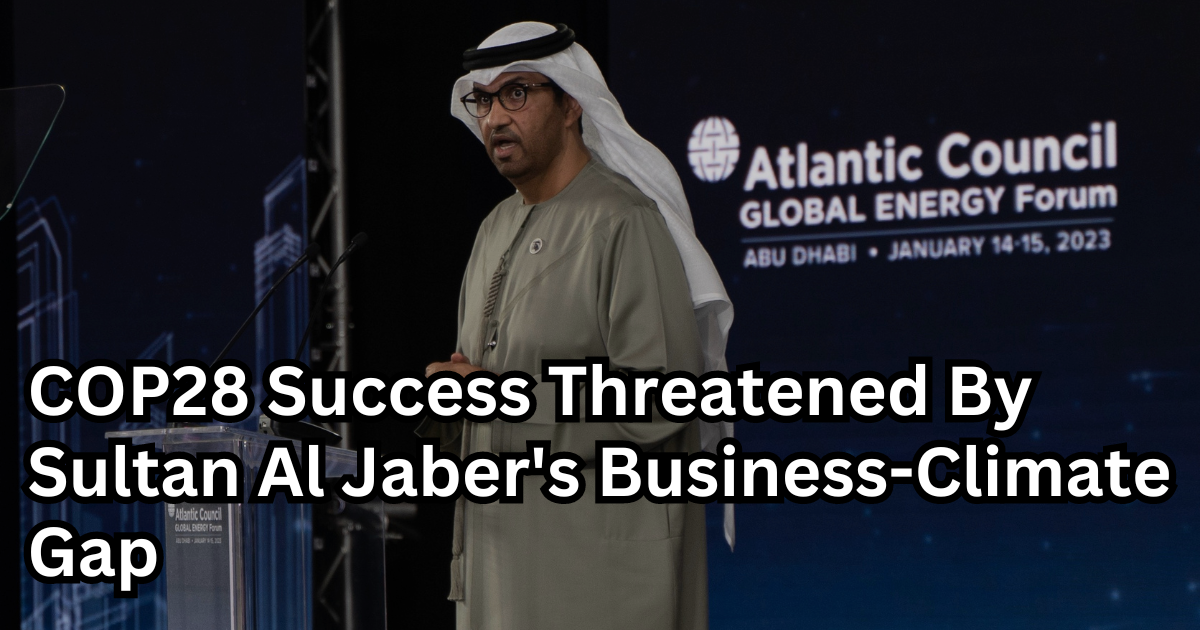In an unprecedented move, Sultan Al Jaber, the formidable president overseeing the upcoming United Nations climate conference, COP28, in Dubai, finds himself under intense scrutiny. Critics argue that his role as the CEO of the United Arab Emirates state-owned oil company raises ethical concerns, casting a shadow over the global efforts to address climate change.
The juxtaposition of Al Jaber’s leadership at COP28 with his position in the oil industry has triggered a wave of criticism from various quarters. While not a singular entity, the climate community has expressed reservations about the potential conflict of interest inherent in having an oil magnate spearhead a conference dedicated to tackling the issues associated with fossil fuels. As the world grapples with the urgency of climate action, skeptics question the sincerity of such a leadership choice.
One of the central contentions against Al Jaber’s dual role is the inherent conflict between profit-driven business decisions and the moral imperative of addressing climate change. Climate advocacy groups argue that placing an oil CEO at the helm of a climate conference sends mixed signals and may compromise the integrity of the discussions. Critics contend that the industry’s historical denial of climate science and obstruction of climate-related measures raises serious doubts about the commitment to substantive change.
While advocates emphasize the moral necessity of prioritizing climate action, business decisions are often guided by financial considerations rather than ethical imperatives alone. The tension between profit motives and environmental stewardship is a delicate balancing act that Al Jaber is navigating in a high-stakes global arena. The skepticism surrounding his leadership underscores the broader challenges of aligning corporate interests with the imperative of addressing climate change.
Despite the growing chorus of concern, Al Jaber’s supporters argue that his unique position allows for a pragmatic and inclusive approach to the climate discourse. They contend that involving key players from the oil industry in climate discussions is a strategic move to foster cooperation and bridge the gap between divergent interests. In this view, having an oil CEO at the forefront of COP28 could facilitate a more nuanced and realistic dialogue, paving the way for collaborative solutions that benefit both the environment and the economy.
However, critics remain unconvinced, asserting that the potential for bias in favor of the oil industry may undermine the conference’s credibility. The call for a more impartial leadership, detached from vested interests, echoes throughout the climate community. As COP28 unfolds, the world watches with bated breath, scrutinizing whether the conference can genuinely deliver on its promises in the face of this controversial leadership.
Another concern raised by skeptics is the historical track record of the UAE in addressing climate change. Despite being a signatory to international agreements, the country’s reliance on oil as a primary economic driver has been a point of contention. Critics argue that the disconnect between rhetoric and action within the UAE raises questions about the nation’s commitment to a sustainable future. The appointment of Al Jaber only adds fuel to the fire, with some asserting that it perpetuates a narrative of tokenism rather than substantive change.
As COP28 progresses, the role of Sultan Al Jaber continues to be a focal point of debate. The juxtaposition of his leadership with the broader goals of the conference invites reflection on the complexities of corporate involvement in climate governance. Critics argue that true progress requires leadership free from the shackles of vested interests, while supporters maintain that a pragmatic, inclusive approach is the key to achieving meaningful results.
The Bottom Line
In conclusion, the controversy surrounding Sultan Al Jaber’s leadership at COP28 reflects the inherent tensions between business interests and the imperative of addressing climate change. While advocates emphasize the potential for inclusive dialogue, skeptics remain wary of the ethical implications of having an oil CEO at the helm. As the conference unfolds, the world awaits the outcome, questioning whether COP28 will be a turning point in climate action or a missed opportunity marred by conflicting interests.






